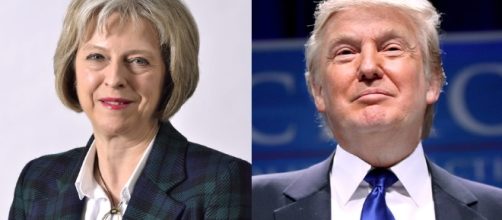Theresa May is set to visit Donald Trump this week, becoming the first European leader to secure a meeting with the new President of the United States (US). The Guardian even stated that it was a "major diplomatic coup". But as the visit looms, it gives us an opportunity to look back at the relationship between Britain and the US over the years and see how it will compare with that of Trump and May.
Background information
There is often talk of a 'special relationship' between the two countries, which dates back to the leadership of US President Franklin D.
Roosevelt (FDR). During the war, FDR sought "closer ties" with the British to "enhance and extend" the American military and economic power during the Second World War. This was done essentially to "maintain the security" of the US against attack, the Roosevelt Forward website notes.
The special relationship over the years
The question to ask is, how has this 'special relationship' been over the years? For the most part it has been very good as the following examples illustrate. In the 1980s the two respective leaders of Britain and the US were Margaret Thatcher and Ronald Reagan. As the Telegraph reported, they were described as "ideological soul mates" as they shared a commitment to the free market, low taxes and a strong defence.
Reagan went as far to say that the two countries are "bound together by inseparable ties". After the "badly damaged" relationship between Bill Clinton and Britain Prime Minister John Major, it was seen that the 'special relationship' was rejuvenated between Clinton and Tony Blair. Both leaders were seen as "kindred spirits" both politically and personally. The relationship intensified further between Blair and George W Bush, so much so that Blair came to be known as the US President's "poodle". However, there have been times when the relationship has been somewhat strained. Relations were "chilled" between Barack Obama and Gordon Brown, especially as a result of the Scottish government's decision to release the Lockerbie bomber from jail in 2009.
This 'coolness' seemed to continue between Obama and David Cameron, illustrated by the repeated use of the term 'special partnership' and not relationship. Relations were further strained over the BP oil crisis, with Obama publicly laying the blame on the British company.
What about Trump and May?
So how about the relationship between Trump and May? It seems that the relationship will be very strong. Already Donald Trump is planning a new deal for Britain this week. This includes a new 'passporting' system which would allow British and American companies to trade with each other with minimum regulatory hurdles. In addition Trump wants to help as much as he can in the post-Brexit world. What is also key is that Trump actively wants to strengthen the special relationship.
The Daily Mail stated that this desire is based on a combination of "empathy and enlightened self-interest". This can already be seen in the relationship between Trump and May. A source close to the US President told The Telegraph that Trump has taken to calling May 'my Maggie'. The source went even further to say that the 'special relationship' is "back, front and centre on a scale not seen since Maggie".
Whatever the future holds for the US or Britain, it is comforting to know that both nations want to return to a time when the special relationship was not questioned. This may well prove crucial as we face the challenges around the world in 2017.

